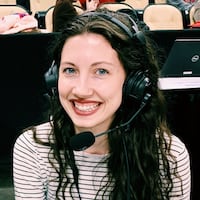Hawks principal owner Tony Ressler had been looking for a way to create a one-stop shop where Black and minority entrepreneurs could gain access to both capital and mentorship.
When he heard about the Herman J. Russell Center for Innovation and Entrepreneurship (RCIE), it seemed like a natural partnership for the Ressler Gertz Family Foundation, the philanthropic organization of Ressler and his wife, Jami Gertz.
“I was like, why would we ever try to reinvent the wheel?” Ressler said. “They have what I want to support and, frankly, make bigger and better.”
So a relationship was formed, and it’s one of many steps the Hawks and the foundation are taking to help economically empower the Black community in Atlanta, investing $40 million total in the process.
First, they are contributing $5 million to the RCIE, the largest nonprofit center for Black entrepreneurs in America, offering financial resources to Black-owned businesses and entrepreneurs throughout the city. The RCIE was founded in 2019 by the Russell family (which includes H.J. Russell & Co., the largest minority-owned real estate and construction company in America, and Concessions International LLC, the largest Black-owned airport concessions company in the U.S.) is named for Atlanta business icon Herman J. Russell, who died in 2014 and was one of the initial owners of the Hawks.
One of the RCIE’s primary goals is assisting those entrepreneurs in forming relationships that can help them succeed. Senior level Hawks executives also will be mentoring entrepreneurs in RCIE programs.
“Many of these young entrepreneurs didn’t grow up with the network of Wall Street contacts, of banking contacts, of venture-capital contacts, of private-equity contacts,” said Ressler, who has worked in the investment world for 35 years or so. “It doesn’t make it a lesser business, it’s makes the business less connected maybe, but not less valuable.”
That donation will help the RCIE facilitate partnerships between Black entrepreneurs and corporate partners, as well as provide those entrepreneurs with financial support and increase access to capital.
When the RCIE first got started, it polled 1,500 Black entrepreneurs in the South asking what their No. 1 need was – although capital was the expected answer, the need for community actually ranked first.
“I think the only difference between Bankhead and Buckhead is access, opportunity and exposure,” Russell Center president and CEO Jay Bailey said. “That’s it. We lose GDP every year because we have not figured out how to make the economy work and innovation work for those south of I-20. And the ideas and the intelligence and the genius and the brilliance that exists in those brains, never reaches the marketplace because we’ve never created those pathways, we’ve never made those connections, and that’s at the heart of what we want to be able to do.”
Atlanta has the right pieces in place, from HBCUs, Georgia Tech and Georgia State to other corporations based here, to help Black entrepreneurs succeed, Bailey said. And the contribution from the Ressler Gertz Family Foundation provides the Russell Center with some stability while it tries to do just that.
“For Tony’s gift over five years, it’s just like basketball, you’ve got to have the right team on the court to win,” Bailey said. “And this kind of gift allows us to look at a five-year runway to make sure that we have the staff, the mentors, the support in place, for companies to take the journey from where they are to where they want to be. That kind of stability is something that doesn’t happen often with nonprofit organizations and certainly younger nonprofit organizations, so it’s truly a gift and helping us with sustainability, stability and making sure we’re putting the talent on the court that’s going to win.”
As Atlanta ranks among the lowest cities in the nation for economic mobility for Black people, the RCIE aims to act as a catalyst for change and create 2,000 jobs and 250 startup companies in the city, and give resources to 700 businesses so they can grow by five to 10 employees. It also hopes to increase wealth in Black households in the area by $70 million over the next five years.
If successful, it’s possible that the partnership between the Russell Center and the Hawks can act as a model for other cities and organizations around the country, Ressler thinks.
“If you help tens or hundreds of businesses, you’re helping hundreds of thousands if not millions of employees of those businesses, so please hear us that the impact is enormous if we do it right, and then think about 30, 40 other markets, major economic centers around this country wanting to understand what we’ve gotten right at the Russell Center so that they in fact can copy or at least learn from what we’ve been doing,” Ressler said.
Also, in a league-wide effort to further the economic empowerment of the Black community, the Hawks Foundation also pledged $10 million over 10 years to the NBA Foundation (Ressler sits on the Board of Directors), which was launched in August and involves working with all 30 teams, the Players Association and both local and national charity organizations.
The Hawks are also increasing their investment in their Diversity and Inclusion and Corporate Social Responsibility/Community Development departments with an $11 million investment, which includes hiring a vice president of D&I Programming. The franchise has upped its commitment to community programs with a minimum of $14 million over 10 years, and State Farm will be expanding its Good Neighbor Club program, which heads up a court renovation program so more children in the Atlanta area have a chance to play.
One of these community programs, ‘Hawks at Home,’ was formed recently in response to the coronavirus pandemic, and through a partnership with Atlanta Public Schools acts as a resource on health and wellness for students, teachers, and coaches.

